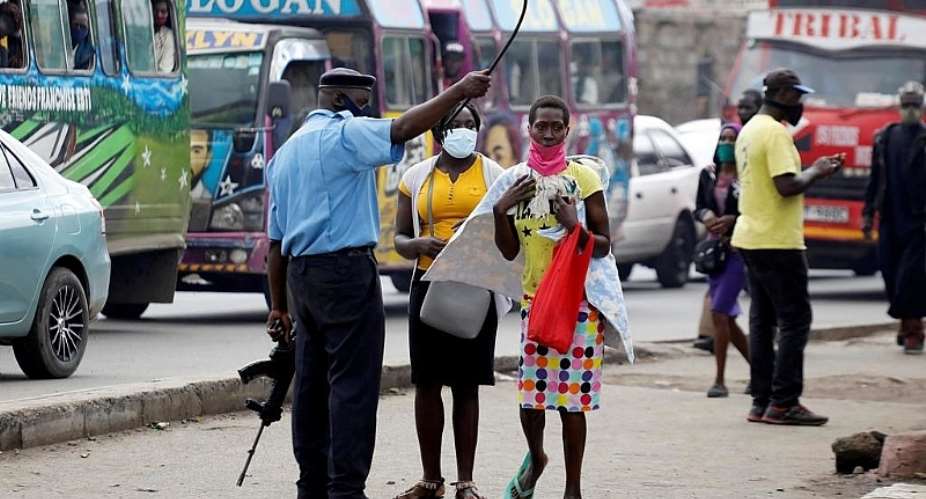The World Health Organisation urges countries to press on with efforts to contain the novel Coronavirus, noting the pandemic is worsening globally while lockdown restrictions are being eased. Africa has not spared as the rate of infection is on the rise.
Tedros Adhanom Ghebreyesus, director-general of the World Health Organisation, said the Covid-19 pandemic was “worsening” worldwide, noting that June 7th recorded the biggest ever one-day total with more than 136,000 cases.
“Most countries in the African region are still experiencing an increase in the number of Covid-19 cases, with some reporting cases in new geographic areas,” he said.
“Although most countries in the region have less than 1,000 cases.”
South Africa is the worst hit country on the continent with 50,879 reported cases.
But with 1,080 deaths, South Africa comes second to Egypt which recorded 1,237 deaths but 34,079 reported cases.
South Africa's cases are “rising fast,” according to President Cyril Ramaphosa. More than half of all confirmed cases have been recorded in the last two weeks, prompting concerns that the country could see a steep rise in infections shortly after restrictions are relaxed.
South Africa has been gradually easing tight restrictions imposed in March. It is now allowing some school children to return to classes and most of its businesses to operate.
"As we watch the number of infections rise further -- probably far faster than most of us imagined -- we should be concerned but not alarmed," said President Ramaphosa.
"That is because we have the ability to limit the impact of the disease on our people.”
Most of South Africa's infections - around two-thirds - are found in the Western Cape province, a popular tourist destination home to the coastal city of Cape Town.
“South Africa's response looked quite promising initially, but it seems premature to release the lockdown without a better level of testing in place,” said Dr. Nathalie Macdermott, a clinical lecturer at King's College London.
Dangers of re-opening mining
South Africa's mining sector resumed full activity nine days ago. Health authorities noticed that a third of new cases in Limpopo and North West provinces are miners or their families.
The big mining companies have requested that 10,000 workers from neighbouring Lesotho and Mozambique be allowed to resume work in the country. A move which is worrying the authorities as it may further spike the level of infection.
“Politicians may be desperate to get their economies going again, but that could be at the expense of having huge numbers of people die,” said Dr. Bharat Pankhania, an infectious diseases expert at the University of Exeter in Britain.
He said re-imposing recently lifted lockdown measures was equally dangerous.
“Doing that is extremely worrying because then you will build up a highly resentful and angry population, and it's unknown how they will react,” Pankhania said.
According to Clare Wenham from the London School of Economics, poor countries are not entirely without options, noting early pre-emptive actions by Sierra Leone and Liberia.
"They learned from the Ebola outbreak and moved quickly when they decided their economy couldn't cope with community transmission,” she said.
But in many other poor regions where crowded slums and streets mean that even basic measures like hand-washing and social distancing are difficult, the coronavirus is exploding now that restrictions are being removed.
“More than six months into this pandemic, this is not the time for any country to take its foot off the pedal,” warned WHO's Tedros.





 Lay KPMG audit report on SML-GRA contract before Parliament – Isaac Adongo tells...
Lay KPMG audit report on SML-GRA contract before Parliament – Isaac Adongo tells...
 Supervisor remanded for stabbing businessman with broken bottle and screwdriver
Supervisor remanded for stabbing businessman with broken bottle and screwdriver
 NDC watching EC and NPP closely on Returning Officer recruitment — Omane Boamah
NDC watching EC and NPP closely on Returning Officer recruitment — Omane Boamah
 Your decision to contest for president again is pathetic – Annoh-Dompreh blasts ...
Your decision to contest for president again is pathetic – Annoh-Dompreh blasts ...
 Election 2024: Security agencies ready to keep peace and secure the country — IG...
Election 2024: Security agencies ready to keep peace and secure the country — IG...
 People no longer place value in public basic schools; new uniforms, painting wil...
People no longer place value in public basic schools; new uniforms, painting wil...
 'Comedian' Paul Adom Otchere needs help – Sulemana Braimah
'Comedian' Paul Adom Otchere needs help – Sulemana Braimah
 Ejisu by-election: Only 33% of voters can be swayed by inducement — Global InfoA...
Ejisu by-election: Only 33% of voters can be swayed by inducement — Global InfoA...
 Minority will expose the beneficial owners of SML, recover funds paid to company...
Minority will expose the beneficial owners of SML, recover funds paid to company...
 Prof. Opoku-Agyemang has ‘decapitated’ the NPP’s strategies; don’t take them ser...
Prof. Opoku-Agyemang has ‘decapitated’ the NPP’s strategies; don’t take them ser...
